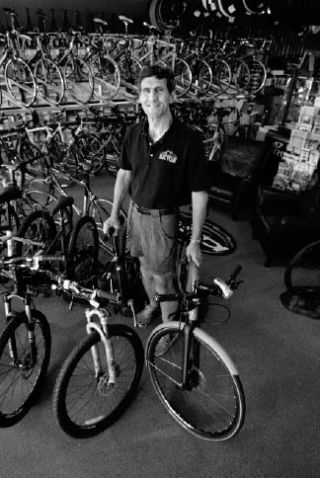It’s difficult to imagine a better location for a bicycle shop than Bainbridge Island.
The countryside is lush, the shorelines stunning. The rural terrain varies interestingly between steep and level. Residents are generally affluent, health conscious and worldly. About one third of its working force commutes to Seattle via ferry, with a growing number climbing onto the saddle because of the costly fares for vehicles. And now we have this oil problem.
Because of its unique qualities, Bainbridge (and the Northwest, generally) has been ahead of the current bicycle-craze curve for many years, allowing the owners of the island’s two independent bike shops to possess the vision and experience required to take advantage of the sunny skies that lie ahead as the cost of gas climbs precipitously toward $5 per gallon.
Both Jeff Groman of Classic Cycle and Tom Clune of BI Cycle have worked in the business for more than 20 years — half of it in the same shop — and, while their styles are decidedly different, they know exactly where they’re going and how to get there.
Their emphasis is on modern bikes with automatic gears, disc brakes and the many amenities that help the bike fit the buyer’s body, special needs and riding habits. For example, commuters prefer sturdy bikes with racks, fenders, shoes and attire for all kinds of weather, tires that last for many months, inner locks, flashing lights and bars that drop or are upright — all depending on the rider’s physical and daily needs.
“We’re interested in making sure people get what they need by fitting the bikes to them, working with their bodies,” says Clune. “That’s a part of the business that’s really changed. People are riding more and it’s important that their bikes are tweaked as their bodies change.”
Both shops have basic frames that are used to fit the bike to a rider’s body type and needs.
“We look at bicycling now as a life sport, where it’s a whole experience at the family level,” says Groman. “It’s a great time to be in the bike business, but it’s hard work and you have to cater to your clients and keep abreast with changes in the industry.”
Both shops started small, then expanded until moving into larger spaces this spring in order to meet the demands of a burgeoning bicycle-owning population and the maintenance required to keep all those two-wheelers on the road. Groman, a bicycle-racing historian, and his wife, Els Heyne, moved Classic into a 3,000-square-foot space in a Harbor Square commercial building on Winslow Way. BI Cycle moved into the old Napa auto parts building on Bjune Drive.
No doubt, both have paid their dues. They were partners on Bainbridge for many years until Clune opened his own shop in 1997. While they are competitive, there are enough bicyclists on the island to go around and the shops are different enough to attract their own clientele.
“There is competition but it’s not cutthroat,” says Clune, “We have carved out our own niche because we do things differently.”
Groman, who calls himself “the brand,” and his wife, “the business,” says he and Clune have different visions.
“Just walk around our shops and that’s evident,” says Groman, who has placed dozens of antique bikes on his walls, which are extensive with the building’s high ceilings. Over at BI Cycle, hundreds of inner tubes hang from pipes that stretch the width of the low-ceiling space. But while the shops are different in feel, they match each other in quality of service and inventory.
“The way I look at it,” Groman says, “on a cycle island like this, the more people on the road the better it is for both of us. And it’s only going to get better.”
The island’s slumping economy has spared the bike shops, and the high price of oil is causing commuters to turn to a cheaper mode of transportation.
“We’re seeing a reaction,” Groman says. “Both shops are thriving, I know that. According to the NBDA (National Bicycle Dealers Association), studies say that when gas at the pumps approaches $7 a gallon then people will start changing their commuting habits more drastically. But it’s already happening here because the ferry is a big factor.”
Washington State Ferries is finally beginning to cater more to bicyclists with between 150 and 200 riding on or off the Bainbridge-Seattle ferries during weekday peak hours.
Groman says retailers such as Wal-Mart and Costco are beginning to react to the crush for more bicycles, but he sees a silver lining in the increase. “The more they sell, that just provides us with more potential for repair work since they don’t do that.”
The full-service, independent bike shops are prospering as more people turn to the bicycle for a majority of their transportation needs.
“Tom and I realized the need to upgrade our stores and add staff to better take care of what’s going on,” Groman says. “The longer the industry exists and the more technical the bikes become, the sophisticated workshops become invaluable. You need to know a lot, whether it’s putting together a racing bike or keeping a commuter on the road.”
Clune thinks America’s bicycle awareness increased dramatically as a result of Lance Armstrong’s racing success, and, once turned on, the infatuation continues to burn hot.
“Cycling has been big in much of the world for a long time, and now we’ve got the bug,” Clune says.
With kids in college, he and his wife, Betty, are hoping for a long, sustained epidemic.


